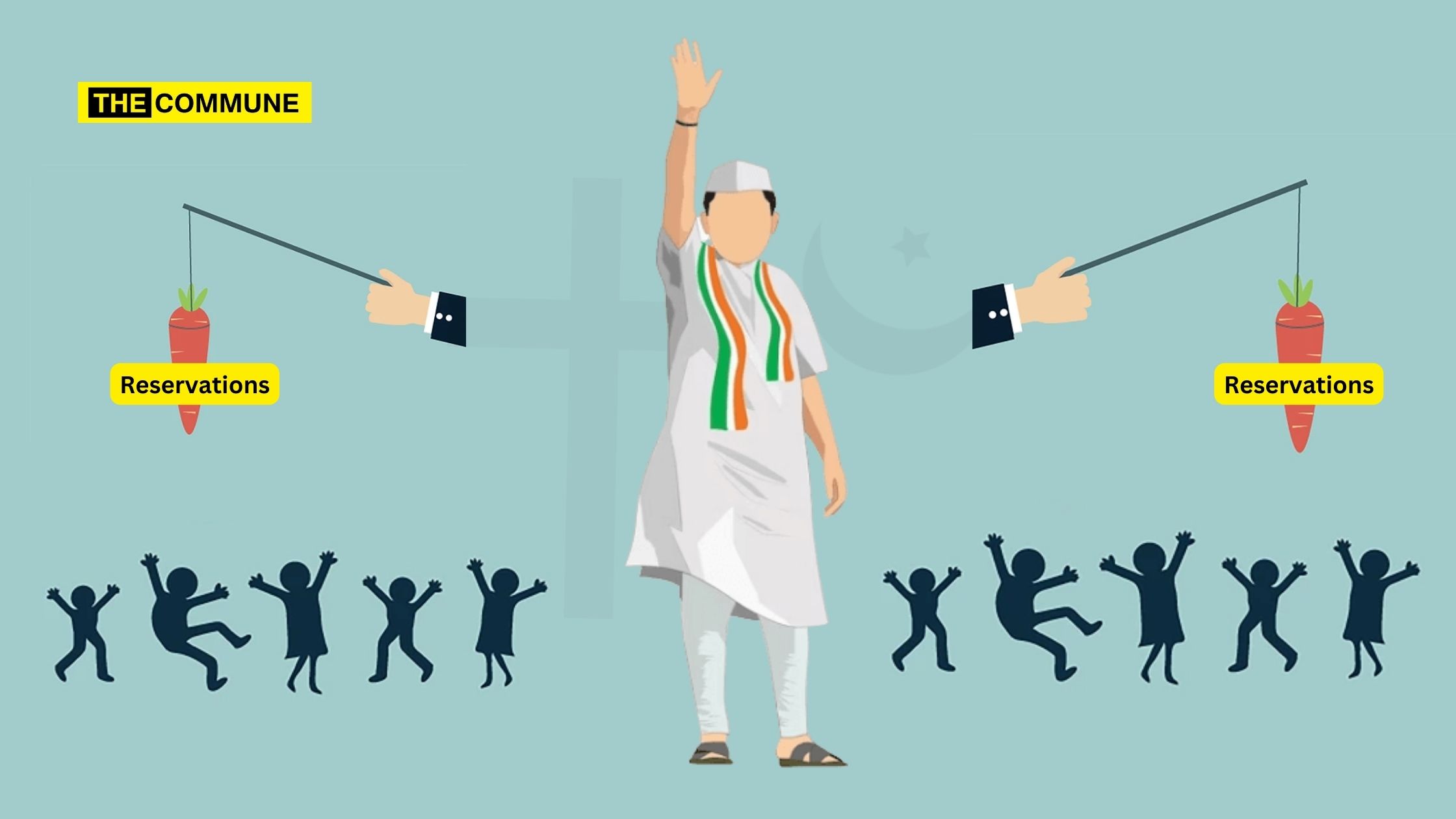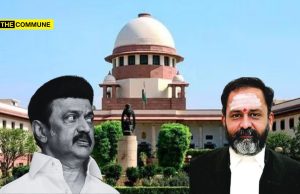
In this 2024 election year, the subject of religion-based reservations and special benefits, came to the spot light in both national and regional news.
Recently, the BJP was in the news on the subject of religion-based reservations, when its regional alliance partner, Andhra’s TDP party (Telugu Desam Party) almost succumbed to pressure from the state’s YSRCP party (a break-away Congress party unit) in offering an attractive religion-based reservation to Muslims. Pradesh polled for a 175-seat state assembly election as well as a 25-seat parliament(Lok Sabha)election on May 13 with the final counting exercise to be conducted on June 4th.
Chandrababu Naidu’s TDP party proposed a Muslim-reservation electoral promise, in an attempt to compete with Jagan Reddy-led YRSCP party’s announcement of continued religion-based reservation for Andhra’s Muslims, with many speculating that it could eventually result in a similar benefit for converted Christians. In further consultations with its national partner, the BJP, the TDP did not go ahead with the proposed religion-based special benefits for Muslims or Christians. The BJP has made it clear to its alliance partners that it is firmly against religion-based reservations, as promised in its national manifesto. The BJP’s stance on this subject is well aligned with the intentional omission for religion-based reservations in the Constitution of India.
It is important to note that Jagan Reddy and his Christian family including his late father, Y S Rajasekhar Reddy, the Christian, Congress party chief minister of the larger undivided state of Andhra Pradesh, have often been accused as among the first to propose a separate reservation for Muslims in the country. This family, true to its pseudo-secular, policies, reminiscent of their deep roots in the Congress party, have also been openly challenged on the allegation of being the master minds and facilitators behind the burgeoning number of unchecked Christian conversions through fraudulent means including state-sponsored financial incentives in Andhra and Telangana, monthly stipends for church pastors and encouraging money-laundering Christian NGOs (non governmental organizations) of dubious intent, supposedly involved in the business of charity.
The Reddy family with its die-hard Congress party roots and links, holds the unsavoury record of being the first state in the country, to introduce a pilgrimage subsidy for Christians, to pilgrimage sites in Israel. All of the above were in addition to the Congress party’s other minority-appeasement policies, including a decades-old free or subsidized pilgrimage for Muslims. Such prejudiced, unwarranted state-sponsored schemes, come at a massive, damaging cost to the native Indic faiths, culture, heritage and true secularism. What place do such biased offerings based on religion, hold in the Constitution of India? Can they be challenged in the top courts?
The Indian Constitution does not provide for reservations and special government-sponsored benefits, based on Religion. The main architects of the Constitution, in their wisdom, envisioned a reservation for a limited period of time, only for certain historically disadvantaged communities based on the practice of caste within the native culture. The temporary reservations recommended in the Indian Constitution was meant to be implemented in good faith, only among certain communities within the purview of the native faiths.
Why did the visionaries of the Constitution not advocate religion-based reservations? This was with good reason, based on the history of our country, along with several historical precedents, which actually indicate the reverse – that both Islam and Christianity do not need protection! In fact, if recorded and verified Indian history is the base for it, it is the native religions that need to be aided with protective measures :
– so that, the Indigenous beliefs and culture may withstand the aggressive preaching and proselytizing practices of Islam and Christianity.
– so that the native faiths, culture and heritage may be preserved for future generations.
Both Christianity and Islam are highly organised, centralized, hierarchical, “self” driven religions, whose goals of self-preservation, self-promotion and increasing their numbers globally, far surpass the unorganized, non-centralized, non-proselytizing native, Indic religions (Hindu and other native faiths), that are far more accommodating, tolerant and assimilative.
The supreme zeal and drive of Islam and Christianity for self-preservation, self-promotion protection and defence as witnessed through the lens of human history, makes it clear that they do not require protection or special state-benefits of any sort. B R Ambedkar and a majority of India’s leaders of the time, including leaders who collaborated with Dr Ambedkar on framing and finalizing the Constitution, were wise enough to understand the ground reality of these two religions aside from what their scriptures promote.
It was with good reason that the stalwarts of the era ignored religion-based reservations while whole-heartedly agreeing to caste-based reservations within the larger Hindu/ native Indic communities, for a limited period of time. The majority of the leaders of the time also prudently chose to omit the word “secular” with its foreign interpretation. Avoiding the term “secular” in the Indian Constitution implied that the native way of life based on the Hindu principles of universal values, acceptance and tolerance, which had survived numerous foreign invasions, would hold steady in its native land of birth – an India that was, is and will continue to be “Bharat” at its core.
Unfortunately, the word “secular” was steathily added in the Constitution by Indira Gandhi during her imposed Emergency period without proper legal procedure or parliamentary consent. In any case, what space does religion-based reservations have in a “secular” country which promises equal treatment of all religions? Aren’t such reservations against the core principles of the Constitution ?
Not a single nation joins “secular” India in the foolish practice of a government-sponsored special status, religion-based reservations and other benefits for their country’s minorities! Going by the historical context of both Islam and Christianity with their aggressive proselytizing agenda of gaining maximum converts to their respective religions, it is Hinduism and the Indic faiths that need protection. Not the world’s largest two religions, that are still growing at the expense of all other, pluralistic, Indigenous traditions!
Throughout the rule of India-Bharat by the various Muslim groups or the Christian British, it was the Indic native religions that were discriminated against in various forms! Ironically, it is Hinduism and the other native faiths, culture and way of life that require protection, in the very nation they were born and thrived before Islamic and Christian dominance.
The Congress and its pseudo-secular, crony political friends are responsible for a mis-guided, mis-placed sense of a silly ‘perceived’ sense of a higher moral high ground, when they call themselves “protectors” of the minorities!! Who are these politicians protecting the minorities from? Do these minorities need protection from the largely peaceful and accommodating, accepting-of-all-faiths, Hindu majority that has suffered at the hands of these very “minorities” at various points in history?
Is it morally or logically right for such political parties to continue with state-sponsored discrimination against the majority in our nation? Reservations based on Religion goes against the principles of these important tenets:
– It goes against true secularism which advocates, either ignoring all faiths equally or treating all faiths with equal favour.
– It goes against the principle of separation of “State and Church”, an attempt to separate governance from religion followed in most modern, progressive Western nations which India seeks to emulate.
– It eats into the share of those truly deserving of reservations based on centuries of community discrimination – the SCs and STs (Scheduled Castes and Tribes) as well as certain backward communities.
– It also impacts the share of reservations rightfully deserved by social groups such as people with various disabilities as well as families falling into the EWS category (Economically Weaker Sections).
– It goes against the intentional omission of religion-based discrimination in the Constitution of India
– Lastly, it’s a incentive to conversion and a threat to the social fabric of the country
Shivani is a freelance writer from Vijayawada.
Subscribe to our channels on Telegram, WhatsApp, and Instagram and get the best stories of the day delivered to you personally.




